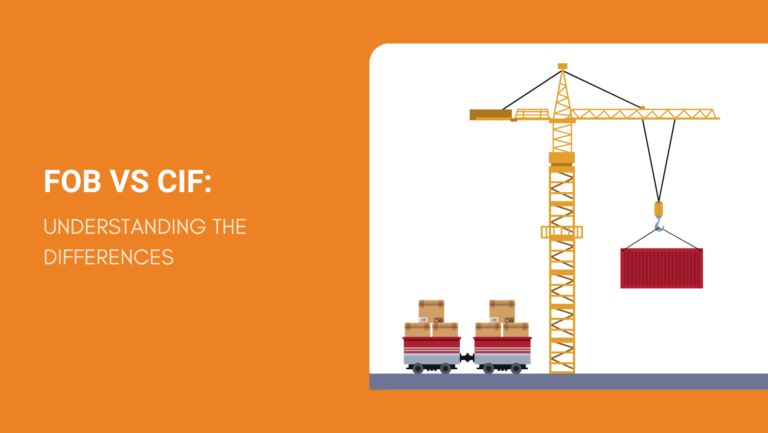Understanding the nuances of international trade is crucial to managing your business’s overseas transactions effectively. Two important terms you will often come across are FOB and CIF.
FOB, or Free On Board, means that the seller bears the cost and risk of delivering goods to the nearest port, but once the goods are on board the ship, you, the buyer, assume responsibility.
On the other hand, CIF, which stands for Cost, Insurance, and Freight, requires the seller to cover not just the delivery but also the cost of maritime shipping and insurance up to the port of destination.
Navigating these agreements can be a bit like charting a course through unknown waters, and making the right choice between FOB and CIF can impact your costs, control over the goods, and overall risk management.
This blog post strives to clearly outline the key differences and help you decide which agreement best suits your business model.
What Is FOB?

When dealing with international shipping, understanding Free On Board (FOB) is crucial. This term outlines the seller’s obligations and gives you more control over the shipping process.
FOB Definition
FOB, or Free On Board, is a shipping term taken from the International Chamber of Commerce’s Incoterms. It stipulates that the seller is responsible for delivering the goods to the vessel at the port of origin.
The key point here is that the seller bears all costs and risks until the goods are securely loaded onto the shipping vessel. Once the goods are on board, the responsibility and risks transition to you, the buyer.
Seller to Buyer Responsibilities Under FOB
Under FOB terms, the seller must:
- Ensure that the goods are packaged and labeled correctly for transport.
- Handle all costs related to the goods until they are loaded onto the shipping vessel, including local freight and port charges.
As the buyer, you take over once the goods are on the vessel. This means you are responsible for:
- Freight costs from the shipping point to your port of destination.
- Any risks once the goods have left the origin port and until they reach your desired destination.
The appeal of FOB for you lies in having significant control over the shipping process and related costs, especially when it comes to selecting your freight service and insuring your goods during transit.
Pros of FOB
When engaging in international transactions, you might choose the FOB (Free On Board) shipping term for its distinct advantages:
Buyer-Directed Control
You gain significant control over the shipping process since you can select your freight forwarder. This control can be critical in managing your supply chain more effectively.
Cost Savings
By choosing your freight services, you potentially lower your shipping costs. You’re not locked into the seller’s choice of carrier, which means you can shop around for better rates.
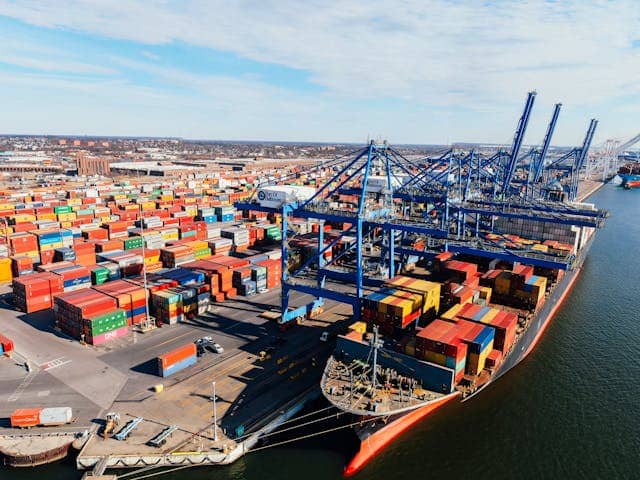
Risk Clarity
There’s a clear point of risk transfer from the seller to you, the buyer. Under FOB terms, the seller is responsible until the goods are loaded onto the ship. After that, you assume the risk — a straightforward handoff.
Transparency in Handling
The transparency of the process allows you to manage the shipping, insurance, and freight procedures in a way that aligns with your business strategy.
By opting for FOB, you stay informed and involved in your shipment’s journey from the start to its final destination.
Cons of FOB
When engaging with FOB (Free On Board) shipping terms, you should be aware of some potential disadvantages that can impact your business dealings. Here’s a look at the cons:
Risk Transfer
The moment your goods are loaded onto the transport vessel, you assume all risks. If anything happens during transit, it’s your responsibility to cover damages or losses.
Logistics Handling
You’ll need to be more involved in the shipping process. This means you need a good understanding of logistics or have to hire experts, which can add to your costs.
Insurance and Costs
Arranging insurance is solely your responsibility. If you aren’t adept at negotiating, you might end up with higher costs.
Customs and Compliance
You’re responsible for all customs formalities, which means handling paperwork and ensuring compliance with international trade regulations.
Freight Charges
While you have control over the choice of freight forwarders, managing these relationships and negotiating terms will require your time and effort.
What Is CIF?
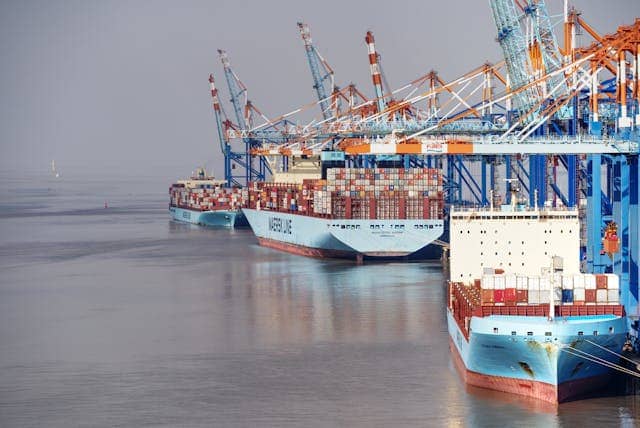
When you’re dealing with international shipping, understanding terms like CIF is crucial. This term outlines specific responsibilities and costs for both the buyer and seller, ensuring clarity and safety in your trade transactions.
CIF Definition
CIF stands for Cost, Insurance, and Freight. It’s a shipping term defined by the International Chamber of Commerce under Incoterms rules, which clarifies that the seller carries the costs, and the freight required to bring the goods to the destination port.
Additionally, the seller procures marine insurance against the risk of loss or damage during the carriage of goods. Under CIF terms, the seller covers a significant portion of the risk and cost until the goods reach the destination port.
Buyer Responsibilities Under CIF
Once the goods reach the destination port, your responsibilities begin. As a buyer, you must handle all further costs and risks, including unloading fees, customs duties, and any additional transportation costs from the port to your final destination.
You must understand that while the seller has covered the goods en route to the port, you take on the responsibility from the moment the goods arrive.
Remember, with CIF, you rely on the seller to procure insurance on your behalf, which might not always align with the level of protection you desire.
It’s a good practice to review the insurance policy details to ensure your goods are adequately protected during transit.
Pros of CIF
When considering shipping on a CIF (Cost, Insurance, and Freight) basis, you gain several notable advantages. Let’s explore the key benefits you can expect:
Less Responsibility
With CIF, your involvement in the complexities of shipping logistics is minimal. The seller handles the cargo arrangements, including the freight and insurance during transit.
This can translate to fewer worries for you, especially if you’re new to international trading.
Predictable Costs

Since the seller manages shipping and insurance, you’re presented with a clear picture of costs upfront. The expense is typically included in the price you pay for the goods.
This predictability can be an enormous benefit for your budget planning and financial forecasting.
Streamlined Process
The ease of having the seller coordinate shipping can save you considerable time and effort. This streamlined approach often results in a smoother transaction, allowing you to focus on other aspects of your business.
Risk Management
The risk of loss or damage to the goods while in transit falls on the seller until the goods reach the destination port. This feature of CIF can give you added peace of mind.
Cons of CIF
When choosing between shipping terms, Cost, Insurance, and Freight (CIF) might seem convenient, but there are some drawbacks you should consider:
Less Control Over Shipping
With CIF, the seller is responsible for arranging the transportation and insurance of your goods up to the destination port.
This might sound stress-free, but it means you’ll have less say in the selection of shipping companies and transit times. Delegating these decisions could affect your inventory planning.
Potentially Higher Costs
Although CIF can shield you from upfront costs, sellers often mark up the price of shipping and insurance to compensate for their extra work and risk. This could lead to higher overall costs for your goods.
Insurance Limitations
The insurance provided by the seller under CIF terms is typically the minimum required. If you want more comprehensive coverage, that’s on you. It’s crucial to assess the potential risks to your goods in transit and decide if additional insurance is needed.
Each term, CIF or FOB, has its trade-offs. Be prepared to analyze these aspects carefully to make the best decision for your business.
FOB vs CIF: Key Differences
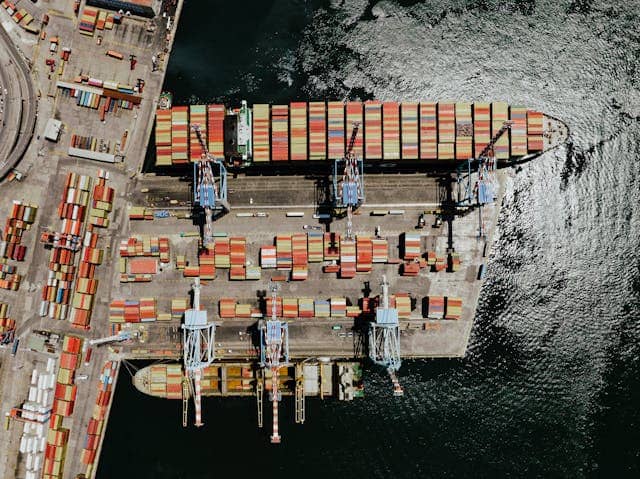
Risk Transfer
In an FOB agreement, the risk passes from seller to buyer as soon as the goods are loaded onto the ship at the port of origin.
Contrarily, under CIF, the seller retains the risk until the goods reach the port of destination.
Control
With FOB, you gain more control over the shipping process as soon as the goods are onboard the ship. This gives you the power to choose your freight and manage costs.
On the other hand, CIF agreements mean the seller handles the shipping and insurance up to the destination port, limiting your direct control.
Costs
Regarding cost obligations, FOB requires you to cover all costs related to shipping, insurance, and freight from the port of shipment.
However, a CIF agreement includes these costs in the seller’s price up to the port of destination.
Insurance
Another distinction lies in insurance coverage. CIF arrangements necessitate the seller to insure the goods for 110% of their value, providing you with added security.
In contrast, insurance under FOB is your responsibility and is optional.
Below is a summarizing table you might find helpful:
| Aspect | FOB | CIF |
| Risk | Transfers at the port of origin once goods are loaded. | Retained by the seller until arrival at the destination port. |
| Control | Buyer has increased control over shipping aspects. | Seller manages the shipping and insurance process. |
| Costs | Buyer handles all shipping-related costs after loading. | Seller includes costs in the price up to the destination port. |
| Insurance | Optional and arranged by the buyer. | Mandatory; seller insures goods to 110% of their value. |
Reflect on your business needs when picking between FOB and CIF, as each term can impact operationally and financially. Your choice can, for instance, affect your inventory costs and degree of control during transportation.
Choosing Between FOB and CIF
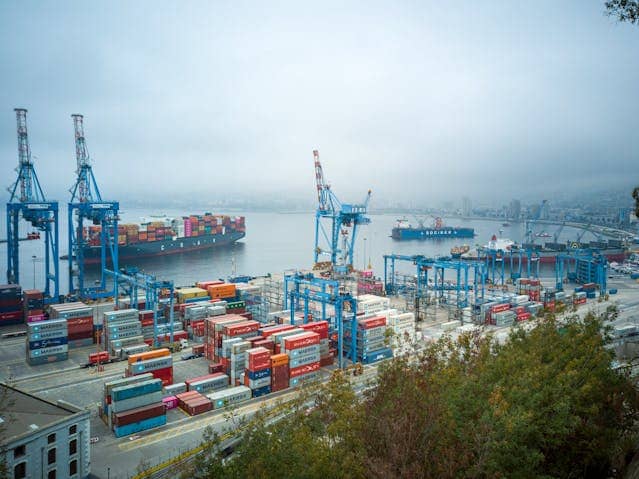
When you’re involved in international trade, deciding whether to use Free On Board (FOB) or Cost, Insurance, and Freight (CIF) can significantly impact your logistics and overall trade experience.
As a buyer or seller, your decision will depend on various factors including business size, trade experience, risk tolerance, and logistical capabilities.
FOB terms mean that sellers are responsible for the cargo until it’s loaded on a vessel at the port of shipment. After that point, buyers take over the risk and costs.
FOB is typically more favorable if you have established logistics channels and prefer more control over the transportation.
Buyer’s Advantage with FOB:
- Greater control over shipping costs and logistics
- Potential lower costs if the buyer has bulk shipping rates.
On the other hand, CIF places responsibility on the seller until the goods reach the buyer’s nearest port. This term includes the cost of insurance and freight up to the destination port.
CIF can be more beneficial for you if you’re either new to exporting or importing or prefer to minimize your responsibility for the goods while in transit.
Seller’s Benefit with CIF:
- Includes insurance, reducing buyer’s risk
- Shipping costs are covered, offering convenience for new traders.
When choosing between FOB and CIF, consider these scenarios:
- If you’re a small business with less experience in navigating the complexities of shipping, CIF could simplify your initial transactions.
- For seasoned traders with established supply chains, FOB allows you to negotiate directly with shipping companies, which could reduce costs.
To tailor these terms to your specific needs, you may find it beneficial to consult with business advisory services or consider export/import training modules to understand best practices.
Remember, your choice will have lasting implications on your trade deals, so weigh your options carefully.

FAQs about FOB and CIF Incoterms
In navigating global trade terms, understanding the differences between FOB and CIF helps you make informed decisions about shipping and associated risks.
Which Is Better: FOB or CIF?
Your choice between FOB (Free on Board) and CIF (Cost, Insurance, and Freight) depends on your needs.
FOB agreements work better if you prefer more control over the shipping and handling processes.
CIF contracts may be more suitable if you want a seller-managed shipping process, where they handle the goods up to your nearest port.
Which Is More Cost-Effective, FOB or CIF?
CIF might be less cost-effective than FOB since it includes insurance and freight charges to deliver the goods to your nearest port.
With FOB, you are responsible for the shipping and additional costs after the goods have been loaded onto the vessel, which means you can potentially negotiate better shipping rates independently.
Does CIF Cover Customs Clearance?
No, CIF typically does not cover the costs associated with customs clearance. Under a CIF agreement, the seller pays for the costs of shipping and insuring the cargo to your port, but you are responsible for the expense and process of customs clearance.
What Are the Legal Implications of Choosing FOB over CIF?
When you opt for FOB, you agree to take on the risks and costs once the goods have been loaded onto the ship at the port of origin. This means you are legally liable for any damage or loss during transport.
Conversely, a CIF contract places more responsibility on the seller until the goods reach your port. As a buyer, this can affect your legal liability and recourse in case of a dispute or issue with the delivery.
Summing Up: Key Insights into FOB Vs CIF for Your Business
When you engage in international trade, choosing the right shipping terms can significantly affect your bottom line.
FOB, or Free On Board, means that the seller is responsible for the goods until they are loaded onto the vessel at the port of shipment. From this moment, the buyer assumes risk and additional costs.
On the flip side, CIF, standing for Cost, Insurance, and Freight, requires the seller to cover costs and risks until the goods reach the destination port.
With CIF, the seller arranges and pays for transport and insurance, thereby increasing their responsibility until the end of the journey.
FOB Summary:
- Buyer is responsible once goods are on the vessel.
- Seller has fewer obligations post-shipment.
- Preferred for bulk commodities.
CIF Summary:
- Seller is responsible for goods until destination.
- Includes insurance and freight in the seller’s costs.
- Benefits buyers by reducing their upfront risks.
By evaluating these terms, you can align your choice with your business’s risk preferences and logistical capabilities.
If you find the idea of sourcing quality products from China appealing, consider requesting a sourcing quote from us at NicheSources.
Engaging with our expertise will streamline your logistics, ensuring a smoother importation process tailored to your business needs.
